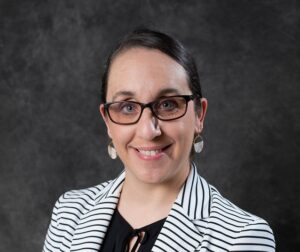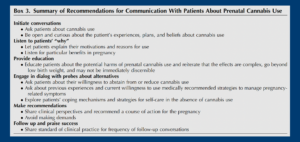Pregnant patients seek open-minded support from doctors on cannabis

[ad_1]
Kaiser Permanente researchers asked focus group participants what they wanted from medical professionals
People who have used legal cannabis during pregnancy say they would welcome non-judgmental advice from their doctors about its possible negative side effects, according to new focus group research led by Kaiser Permanente Northern California researchers. The qualitative study was published in the journal Obstetrics & Gynecology on August 10.
Many focus group participants said they perceived prenatal cannabis use as safer than prescription medications to manage symptoms such as morning sickness or anxiety. They also said they would be open to talking with their obstetrician about potential risks of cannabis use in pregnancy.

“Patients want to have a back-and-forth dialogue with their clinicians,” said lead author Tara Foti, PhD, a former research fellow with the Kaiser Permanente Division of Research. “Folks who use cannabis regularly are often doing so because they perceive a benefit from it, including during pregnancy. But if the doctor brought up the issue in a non-judgmental way, listened to their reasons for use, and explained the risks involved, patients would likely welcome that.”
The virtual focus groups were held in California, where cannabis use for adults aged 21 and older is legal. Kaiser Permanente Northern California includes routine screening for cannabis and other substance use at the start of prenatal care through a self-administered questionnaire and a urine toxicology test as part of its Early Start perinatal substance use screening and intervention program.
Current recommendations from the American College of Obstetrics and Gynecology (ACOG) suggest avoiding cannabis during pregnancy, citing research that has found a higher risk of a low-birthweight baby and potential neurodevelopmental problems associated with prenatal cannabis use.
Pregnant patients often lack access to information about potential health risks from prenatal cannabis use, said senior author Kelly Young-Wolff, PhD, MPH, a research scientist with the Division of Research. “Pregnant individuals desire concrete information about the risks associated with prenatal cannabis use,” Young-Wolff said. “Many have heard that there are risks associated with use, but they have also seen friends and family use cannabis without any obvious adverse outcomes.”

“It is important to provide education that the risks of prenatal cannabis use are complex and can extend beyond easily measurable outcomes — such as low birthweight — into childhood when the connection with prenatal cannabis use and adverse outcomes is less obvious,” she added.
The focus groups included 53 participants, all pregnant individuals who self-reported cannabis use at prenatal care visits in late 2021. Thirty of the participants self-identified as white and 23 as Black; the study focused on these two groups because previous research identified them as the most likely racial or ethnic groups to use cannabis during pregnancy.
Some participants reported that they stopped using cannabis in early pregnancy because of concerns about health risks, but others perceived there was a lack of scientific evidence or believed that prenatal cannabis use is safe.
Perspectives of the Black and white participants were generally similar, though a few Black participants described concerns about racial bias related to their prenatal cannabis use.
Advice for clinicians
The researchers found that “participants valued open interactions with obstetricians that acknowledged their motivations for use, and they desired information about potential risks through conversations and educational materials.”
ACOG recommends that doctors ask pregnant patients about substance use including cannabis, and counsel them about potential adverse health consequences of continued use during pregnancy.
 The study authors also offered suggestions to clinicians, based on what they heard the focus group participants say. These include initiating conversations with patients about cannabis use; being open and curious about the patient’s motivations for use and perspective; educating patients about the potential risks of use; and exploring patients’ coping mechanisms and strategies for self-care in the absence of cannabis use.
The study authors also offered suggestions to clinicians, based on what they heard the focus group participants say. These include initiating conversations with patients about cannabis use; being open and curious about the patient’s motivations for use and perspective; educating patients about the potential risks of use; and exploring patients’ coping mechanisms and strategies for self-care in the absence of cannabis use.
“We ended up with really specific, practical recommendations for clinicians that come from a patient perspective, that could make communication a lot more effective,” said Foti. “What we heard patients say was that if a clinician was not open to having that dialogue, the patient would look for information elsewhere.”
The clinician’s job is not to judge, but rather to educate and openly discuss options with patients, said study co-author Deborah Ansley, MD, regional medical director for KPNC’s Early Start prenatal health program. “There are risks to cannabis use in pregnancy as well as to many of the medications that we prescribe,” she said. “Clinicians should learn the patient’s symptoms and reasons for use, and then offer factual and non-judgmental information about the risks of cannabis and other treatment options in pregnancy.”
The study was funded by the National Institutes of Health and The Permanente Medical Group Delivery Science and Applied Research Program.
Additional co-authors were Esti Iturralde, PhD, Andrea Altschuler, PhD, Monique B. Does, MPH, Melanie Jackson-Morris, MS, and Sara R. Adams, MPH, of the Division of Research; Andrea Green, PsyD, of the Kaiser Permanente Sacramento Medical Center; and Nancy Goler, MD, and Amy Conway, MPH, of Kaiser Permanente Northern California regional offices.
# # #
About the Kaiser Permanente Division of Research
The Kaiser Permanente Division of Research conducts, publishes and disseminates epidemiologic and health services research to improve the health and medical care of Kaiser Permanente members and society at large. It seeks to understand the determinants of illness and well-being, and to improve the quality and cost-effectiveness of health care. Currently, DOR’s 600-plus staff is working on more than 450 epidemiological and health services research projects. For more information, visit divisionofresearch.kaiserpermanente.org or follow us @KPDOR.
[ad_2]
Source link
